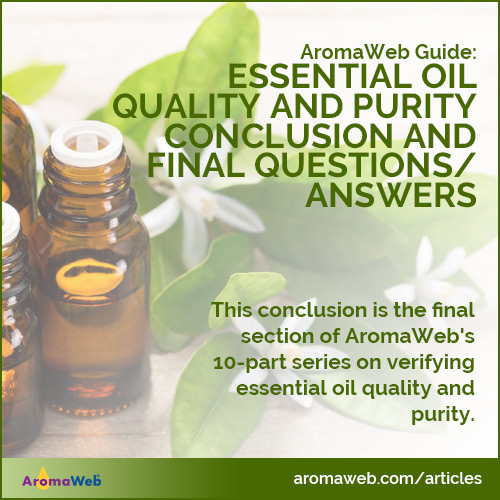Essential Oil Quality and Purity Conclusion: Final Questions & Answers
Are the Tests Foolproof?
GC/MS and the other tests are not foolproof because most retailers and end consumers do not have the equipment or the scientific knowledge to be able read/scrutinize the testing. Testing does risk falsification and also depends on the qualifications, moral standards and knowledge of those performing the tests. Most mid-level suppliers and retailers cannot afford the equipment or training to perform their own testing. Retailers often must trust on the GC/MS and other testing figures provided by their suppliers. Some retailers do go to the expense of having a third party testing facility test the oils that they sell to insure that their supplier is not falsifying GC/MS documents and are providing pure oils, but this added testing is costly and will be integrated into the final cost of the oils they sell.
Some aromatherapists and manufacturers, have oils that they purchase tested by a third party to ensure that the retailers/suppliers that they purchase from are truly supplying unadulterated oils.
Why Don't All Suppliers Perform Their Own In-House Testing?
As mentioned in the "Are the Tests Foolproof?" section, the cost for the testing equipment is expensive, and the ability to utilize the equipment and understand the readings requires specialized training. Some suppliers/retailers do outsource testing on all of their oils. This outsourced testing, however, can become quite costly if a retailer has each lot that they purchase tested (i.e. when they repurchase another lot of the oil when their inventory depletes). To reduce testing costs, some suppliers/retailers perform initial outsourced testing when they find a new supplier and then randomly at periods thereafter to insure that the supplier/distiller's quality/ethics hasn't changed. Some retailers/suppliers rely strictly on the testing performed by the distiller/supplier/manufacturer.
Can I Depend on Companies that State That Their Essential Oils are "Therapeutic Grade" or "Aromatherapy Grade?"
There is no governmental regulating body that grades or certifies essential oils as "therapeutic grade" or "aromatherapy grade." Not all companies use these terms with deception in mind, but consumers do need to be precautious. For more information, read the "Therapeutic Grade" and "Aromatherapy Grade" Essential Oils Do Not Exist article.
How Can Consumers Ensure Purity?
Without the ability and knowledge to directly perform or oversee testing ourselves, we as consumers are in a buyer's beware situation and must hold a great deal of trust in those that we purchase our oils from. In addition to issues of purity, the quality of an essential oil can also be impacted by how a retailer/supplier repackages and stores their oils, and the freshness (how long has that oil been sitting on the shelf?) of the oil. Although a level of "buyer beware" does exist for the average consumer, the risk can be greatly diminished by purchasing your oils from sources that you know have been selling essential oils for at least several years, that cater to the aromatherapy industry, have a good, solid reputation in the industry, and that you know or suspect sell directly to aromatherapists and other aromatherapy professionals. As touched on above, those suppliers that sell adulterated oils will, in time, be "found out" and their reputation will certainly be exposed.
As you begin shopping for essential oils, make it your priority to support the companies that support AromaWeb.
AromaWeb's advertisers support AromaWeb's mission to be an objective online informational resource that provides in-depth aromatherapy information. Visit the Web sites of AromaWeb's banner advertisers and the advertisers within AromaWeb’s Essential Oil and Aromatherapy Business Directory. Although AromaWeb cannot make any endorsement for these companies and there is no implied guarantee of the quality of the essential oils or products they sell, AromaWeb will never knowingly accept advertising from any company that is suspected of being unethical.
For more information, visit AromaWeb's How to Buy Essential Oils article.
It provides important tips regarding other factors that you should
consider when choosing essential oils from particular suppliers.
This topic consists of several separate related articles. Use the links shown below to navigate through the series.
- Part 1: Introduction
- Part 2: Why Is the Quality/Purity of an Essential Oil Important?
- Part 3: Aren't Most Essential Oils Pure?
- Part 4: Constituents - What do Essential Oils Consist Of?
- Part 5: Quality vs. Purity - Aren't They the Same Thing?
- Part 6: Quantifiable Testing of Essential Oils
- Part 7: GC-MS and GC-FID Test Results: How to Understand and Use Them
- Part 8: Organoleptic Testing of Essential Oils
- Part 9: Other Quantifiable Tests for Testing the Quality and Purity of Essential Oils
- Part 10: Essential Oil Quality and Purity Conclusion: Final Questions/Answers
